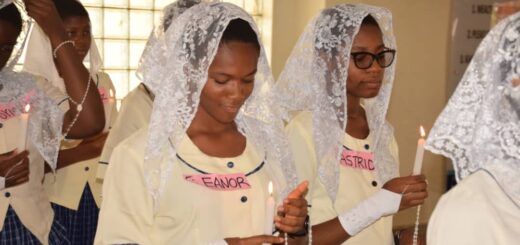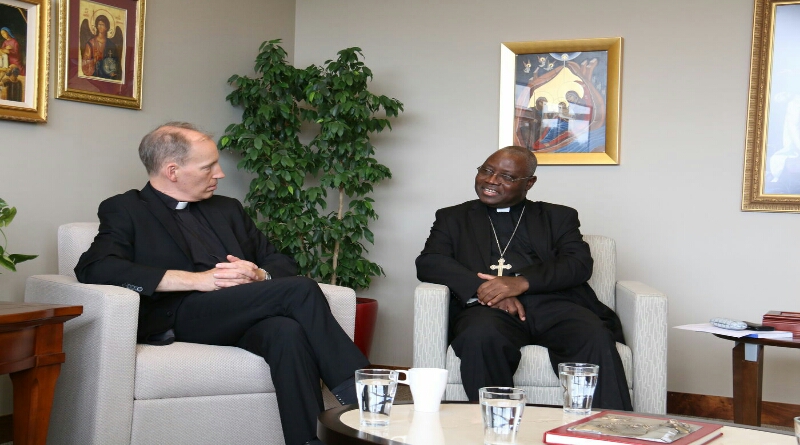Courage and conviction even when faced with opposition and hatred on account of our faith
by ARCH BISHOP · January 30, 2022
Fourth Sunday in Ordinary Time, Year C,
January 30, 2022, St. James Parish Dawaki, Abuja, Homily by Archbishop I. A. Kaigama
Readings: Jer. 1: 4-5, 17-19; Ps. 70(71): 1-6, 15, 17; 1 Cor. 12: 31-13: 13; Lk. 4: 21-30
Our readings today urge us to show courage and conviction even when we are faced with opposition and hatred on account of our faith.
The first reading recounts the call and commissioning of Jeremiah, who lived at a time of great political turmoil in Israel. Jeremiah was charged with the unenviable task of challenging the kings and princes, priests and people of Judah, exhorting a people who were unrelenting in wrongdoing and hostile to the messengers of God to be faithful to the covenant God had made with them. At first, Jeremiah expressed his feeling of weakness and inadequacy when he said he was too young. But the Lord answered: “Do not say, I am only a child”. You must go to everyone I send you to and say whatever I command you. Do not be afraid of them, for I am with you and will rescue you” (Jer. 1:7-8).
Jeremiah’s people however interpreted his preaching as treasonable. No wonder, he was imprisoned, his life threatened and his ministry constantly rejected.
There are three lessons we can learn from the first reading, Jeremiah 1:4-5, 17-19. First, God knows each and every human being: “Before I formed you in the womb I knew you” (Jer. 1:5) and because He created us in His own image and likeness (cf. Gen. 1:26), He knows the number of “even the hairs on your head” (Mt. 10:30).
The second is that God created every human being with a specific mission. No person was created to merely add to the population of human beings. Every person has received a unique calling from God. For example, the mission of John the Baptist was for him to serve as the forerunner of Jesus Christ. Jesus’ mission was to die and save humanity from sin and death. And he did just that. The Church reminds us that God “chose us in Christ before the foundation of the world to be holy and blameless before him in love” (Eph. 1:4).
The third lesson is that we may experience challenges in the course of our mission. Suppose your marriage is experiencing difficult times, or your business, or your health, or you are facing difficulties in your office, will that make you quit loving God? Nothing should separate us from the love of God. Or when in a new pastoral area, a priest who suffers because there is no land, church building, parish house, or an income enough to sustain him, will say he is suffering and so should quit? Dear friends, it is when our mission is challenged that we experience the true test of our love for God and the commitment to whatever He has given us to do.
The rejection of Jesus in the Gospel today by His own people would continue when they would ask Pilate to crucify Him and release to them Barabbas the thief. Jesus’ own people saw Him only as the son of Joseph the carpenter, born before their eyes claiming to be the Christ (cf. Lk. 4:22). They did not also like Jesus for reminding them that God was not just “their God” but the God of all peoples, the God who showed mercy to the widow of Zarephath and the Syrian, Naaman, both Gentiles. Like most of Jesus’ contemporaries, the people of Nazareth believed that they and they alone, were “God’s chosen people”. Jesus challenged them to move from a narrow vision of God to a more inclusive one. They wanted miraculous signs from Jesus as evidence to believe in Him but Jesus refuted this human logic with the demands for faith and trust in God’s word.
Our second reading from the letter of St. Paul to the Corinthians explains the attributes of the love that is sensitive to the neighbour (cf. Mt. 25:35-40). Attributes of love such as being patient, kind, gentle, forgiving, etc., will heal our badly wounded society, making our political, religious or traditional leaders and all Nigerians more sensitive to and respectful of one another.
The story of Jesus’ rejection by His townspeople should challenge leaders to accept rejection and criticism even when they think they are doing their best; after all, their best may not be what the people cherish. For us religious leaders we must remain ardent in preaching the truth with courage and not be deterred even by threats to life. We are called to be the Jeremiah of our day: tell truth to power. Unfortunately, many religious leaders who are sadly preaching miracles and prosperity are now dabbling into political forecasting in the name of divine prophecy. When they claim that party A or B will win elections in a given State, or nation, or a certain strong political personality will win rather than the other, these are mere fruits of political calculations or pure guess work, and may not be a result of any special supernatural or divine revelation. Serious religious leaders must not arrogate to themselves prophetic political certitude by such distracting predictions, when they should be only concerned with issues of moral regeneration of lives and the constant call to spiritual decency. Prophets should worry rather about people encouraging them to do away with a mentality that rationalizes sin, corruption and calls evil, good.
True Prophets don’t just glory in predicting the political future; they are rather to serve the people of God and to bring God’s word to them; to be models and witnesses by the edifying words that come from their lips and the courageous witness of their lives. Unlike many contemporary ministers who are out to seek a ministry of comfort, affluence and convenience, the priest is called to identify with his flock in their social and existential contexts, and in the words of Pope Francis, “to smell like the sheep”. Religious leaders must resist the temptation to do influential people’s bidding by prophesying electoral victory or massaging their worldly ego and during public religious gatherings.
To the candidates for confirmation, like Jeremiah, you are called in our Church today to share your gifts as Catechists, Church Wardens, Lectors, Choristers, MODs, Cadets, etc. To all of us, I wish us prophetic courage and optimism; to remain good even in the face of evil against us.
May the Holy Spirit come down upon us to make us strong Christian witnesses; constant in faith and strong in Christian convictions even when it hurts.
May God bless your Parish priest, Rev. Fr. Matthew Maleek, his team of collaborators and indeed all the members of St. James Parish, Dawaki, and keep you all in His peace and love.




